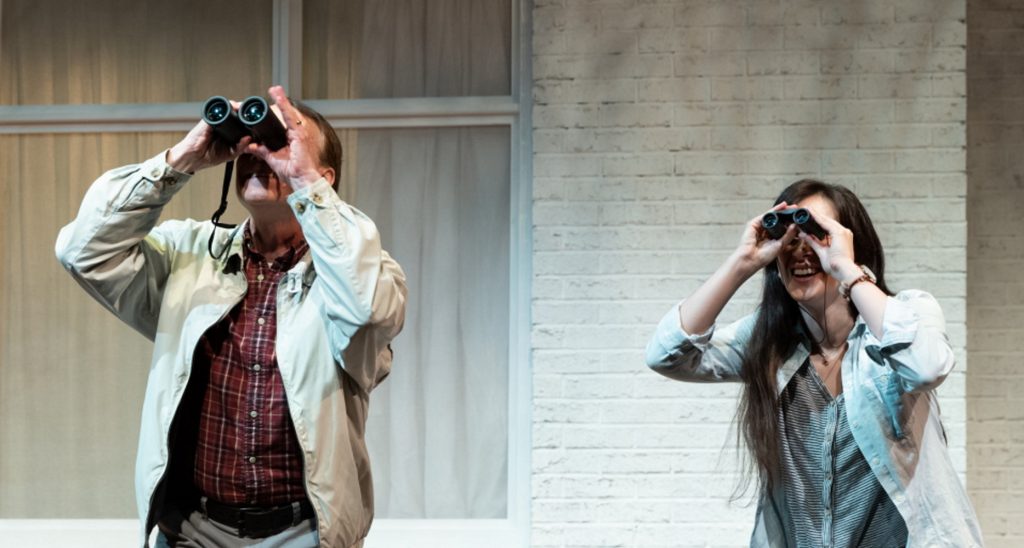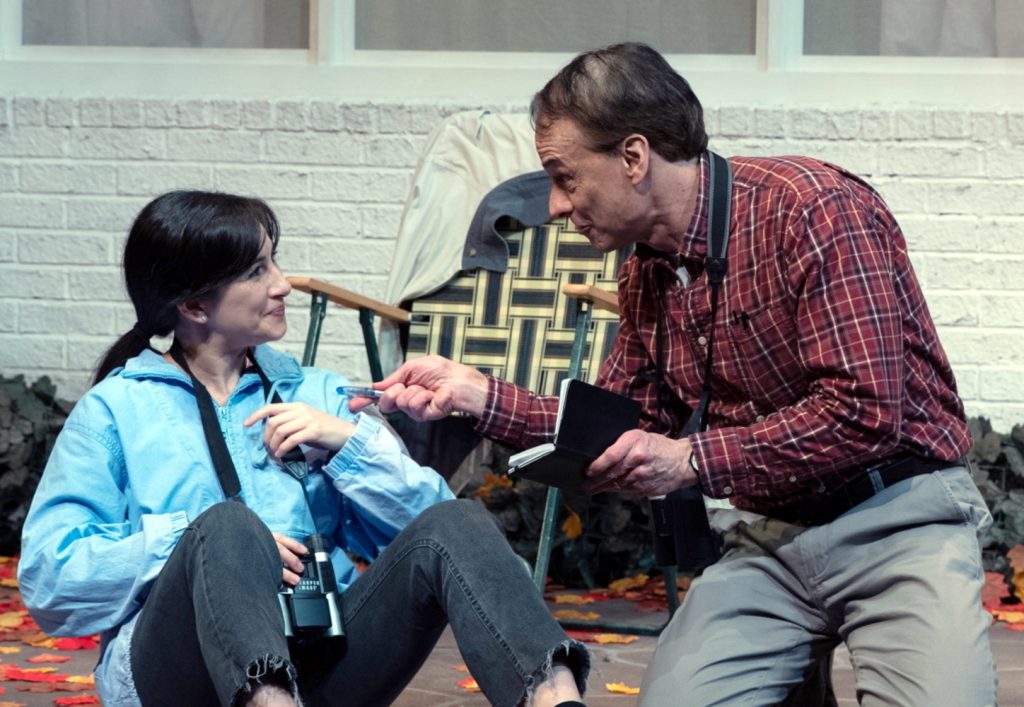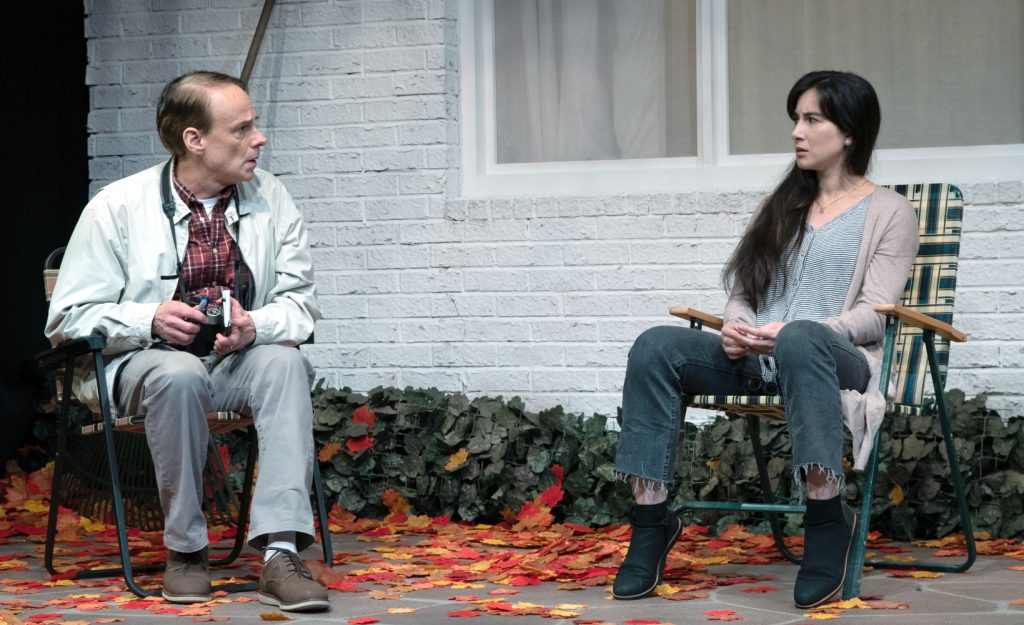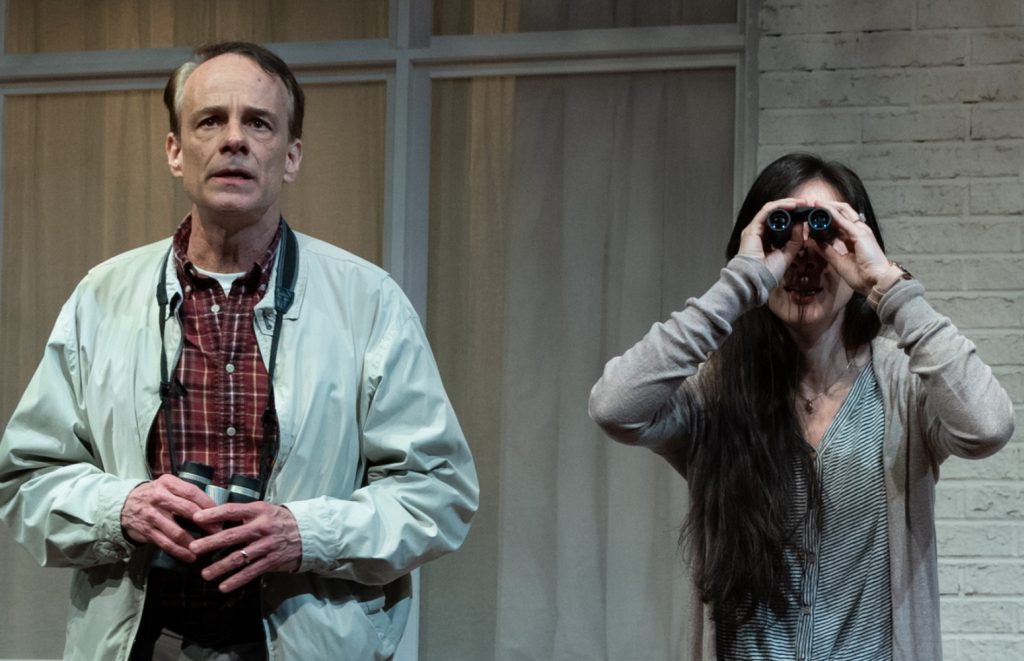Plays about Big Issues are often more issue than play. Too many are simply platforms for a message, their characters little more than representatives of situations or points of view.
The Big Issue in Anna Ouyang Moench’s Birds of North America, at Chester Theatre Company through July 17, is climate change. In a recent interview Moench said, “For a long time, I’d wanted to write about the human experience of climate change. I didn’t want to sound preachy or like I was trying to teach a lesson. I wanted to write a play that was a real play.”
It’s a real play, and doesn’t hammer on her theme. It’s more metaphor than polemic, more quiet anguish than loud confrontation. And though the two characters occupy differing positions on the issue, their relationship is not defined by it.
This is the kind of piece in which Chester specializes and excels – small, subtle dramas that pull you in and make you think. Director Alex Keegan lends a sensitive hand to this one, with performers who nicely contrast and complement one another.
The play unfolds across ten Octobers – moving incrementally through time, like the climate – in a suburban Baltimore back yard, where John and his daughter Caitlyn wield binoculars to spot and identify the birds that pass through.
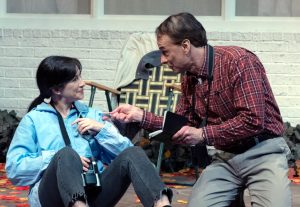 He’s a scientist, working to develop a vaccine against the Zika virus, which can cause birth defects. He’s someone who wants to “contribute something to the world.” He frets about birds’ migration patterns being disturbed by warming seasons and pollinators’ habitats being destroyed by development. “There used to be so much more of everything,” he laments.
He’s a scientist, working to develop a vaccine against the Zika virus, which can cause birth defects. He’s someone who wants to “contribute something to the world.” He frets about birds’ migration patterns being disturbed by warming seasons and pollinators’ habitats being destroyed by development. “There used to be so much more of everything,” he laments.
She is twentysomething, then thirtysomething, first with a boyfriend, then a fiancé, then a husband, then an ex. She works as a copyeditor for a right-wing website, insisting to her appalled liberal father that it’s “just a job.” She suffers multiple miscarriages.
The title, Birds of North America, refers of course to the classic birdwatching manual. The book isn’t an onstage prop, but Caitlyn quotes from it at one point and John keeps a parallel notebook in which he diligently records each sighting. This backyard birding is something they share, a mutual interest they have agreed on, we gather, not out of mutual interest but as an excuse for Caitlyn come down from New York City to visit her parents (we never see her mother) and build a relationship with her father.
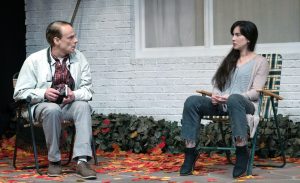 It isn’t easy. From the outset, in year one, there’s a palpable tension, a trying too hard on both sides. As the playwright says in a script note, “John and Caitlyn take nearly everything the other says personally.” Whenever one of them pushes, the other pulls away. (It’s telling, perhaps, that the binoculars required for their chosen bonding activity keep them from looking at each other.)
It isn’t easy. From the outset, in year one, there’s a palpable tension, a trying too hard on both sides. As the playwright says in a script note, “John and Caitlyn take nearly everything the other says personally.” Whenever one of them pushes, the other pulls away. (It’s telling, perhaps, that the binoculars required for their chosen bonding activity keep them from looking at each other.)
As John, Christopher Patrick Mullen is lanky and loose-limbed but twitchy, his informal manner belied by persistent chatter and a slightly haunted look around the eyes. We see Micheline Wu’s Caitlyn at first over-eager to connect, self-consciously playful, then slowly taking on the weight of disappointments while more openly defending her career choices. (“I like the oil and gas industry,” she says defiantly of her new job.)
Moench’s script upends expectations at every turn. In the usual two-hander that explores the arc of a wary relationship, we expect mistrust and conflict to resolve into mutual respect and understanding. In a play that explores a Big Issue, we expect a clash of opposing viewpoints and/or a dramatic climax. Moench makes different choices. There’s very little movement in their relationship, no coming together over time – if anything, they grow farther apart – and the underlying message is woven into the edgy vignettes.
Despite her work as a shill for polluters, Caitlyn doesn’t seem to be a climate denier. She just doesn’t care. She likes air conditioning and thinks her father’s reluctance to take a foreign vacation because of the jet fuel is stupid. Her position isn’t one of principle, but apathy.
Ultimately, the piece is about disappointments and missed opportunities. (Warning: some spoilers follow.) Caitlyn writes marketing copy instead of the novel she began and abandoned, and settles in the end for a man who’s “a little boring” and a step-daughter who’s “not scholarship material.” John’s vaccine trials fail, he loses his job, and he botches what could be a joyful moment of connection over a rare bird sighting in an ill-judged phone message.
The passing seasons are peppered with missed opportunities for both of them, in their respective life paths and in their attempts to connect – just as we as a society have missed one opportunity after another to avert the climate cataclysm.
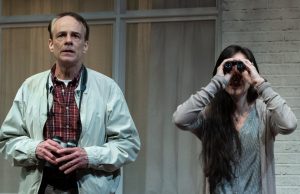 The backyard setting likewise stands for big ambitions but disappointing results. Almost all the birds they train their binoculars on are common species. “I’ve seen so many nuthatches, cardinals, mourning doves, chickadees, I’m sick of them,” John grumbles. Not to mention all the LBJs, the little brown jobs, as birders call them – sparrows, wrens and the like – small, plentiful and hard to tell apart.
The backyard setting likewise stands for big ambitions but disappointing results. Almost all the birds they train their binoculars on are common species. “I’ve seen so many nuthatches, cardinals, mourning doves, chickadees, I’m sick of them,” John grumbles. Not to mention all the LBJs, the little brown jobs, as birders call them – sparrows, wrens and the like – small, plentiful and hard to tell apart.
Movement on Ed Check’s set, a narrow patio littered with fallen leaves, tracks the nature of their interactions – back and forth, with little depth – while Tom Shread’s sound design fills the theater with birdsong.
In the end, I found this play heartbreaking – not poignant or bittersweet, as we might expect, but deeply pessimistic. Like the looming end of the world, aggregating in a sequence of small disasters, the father-daughter relationship remains unresolved. And then it’s too late.
Photos by Andrew Greto
In the Valley Advocate’s present bi-monthly publication schedule, Stagestruck will continue to be a regular feature, with additional posts online. Write me at Stagestruck@crocker.com if you’d like to receive notices when new pieces appear.
Note: The weekly Pioneer Valley Theatre News has comprehensive listings of what’s on and coming up in the Valley and beyond. You can check it out and subscribe (free) here.
The Stagestruck archive is at valleyadvocate.com/author/chris-rohmann
If you’d like to be notified of future posts, email Stagestruck@crocker.com

